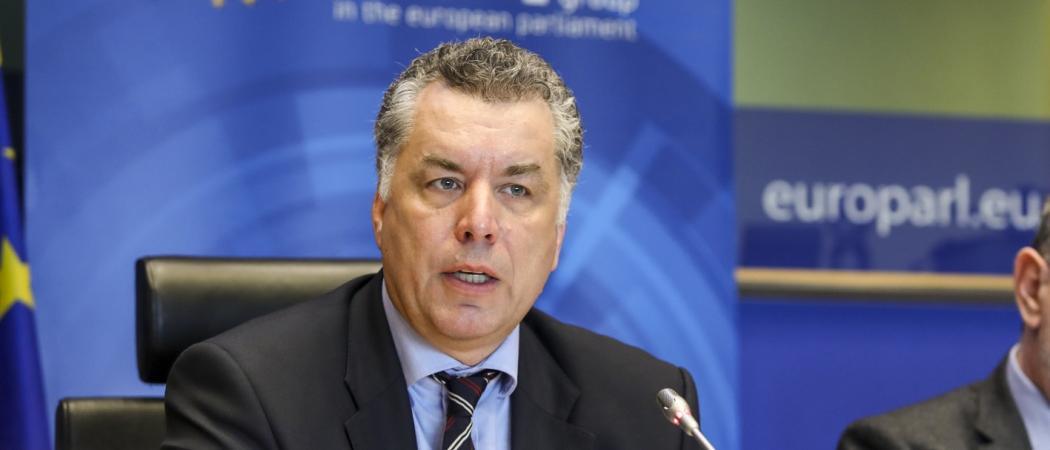Christian Ehler reiterates call for more money, highlights the threat from China and casts doubt over the proposed €10B investment in food and agriculture science

MEP Christian Ehler. Photo: European Parliament
The European Parliament is keeping its shoulder to the wheel in an accelerated effort to sign off on the next EU research programme before the May 2019 European elections, and wants member states to move faster, said German MEP Christian Ehler.
The push to get agreement on the €94.1 billion 2021 – 2027 Horizon Europe programme by spring 2019 is being held up by a behind the scenes political tussle.
Member states say compared to past programmes, including the current Horizon 2020, the draft legislation for Horizon Europe is much shorter and more broadly worded. There are sparse details on exactly which topics and technologies will be supported, with how much money. Countries fear a power play by the Commission, and are not eager to sign a blank cheque.
“Member states are very reluctant about speeding up the process,” Ehler told the Science|Business Open! conference Tuesday. “There are some uncertainties about the programme and we are practically being taken hostage by some of the member states,” he said.
Ehler sits on the Parliament's Committee on Industry, Research and Energy and is one of two leads responsible for steering the Commission’s proposal for Horizon Europe through Parliament. The other is Romanian MEP Dan Nica.
MEPs are keeping their side of the bargain on “fast-tracked” action, according to Ehler. “Our intention was to introduce more speed, and [avoid] the tactical liar’s poker [seen in the Council],” he said.
If the EU budget is not approved before Parliament elections in May 2019, officials warn that negotiations will stagger into 2020, putting the seamless continuation of EU programmes at risk.
Ehler and Nica published reports on Horizon Europe in July, a month after the Commission’s proposal landed. The Parliament may be “a wild zoo” Ehler said, but MEPs have managed to table some 3,000 amendments on the programme. These will be whittled down in the next two months during torturous negotiations between the main political groups.
The Parliament’s aim is to vote in committee on Horizon Europe in November. That will be followed by a plenary vote in December. “We were willing to speed up, without limiting our rights,” Ehler said. “Now we’re looking at the Council, saying, what are you going to do?”
Research ministers are due to meet on Friday in Brussels to assess progress, although expectations are the talks will not move things along sufficiently.
The main problem with the legislative package for German officials, who are usually among the most powerful voices in any debate on EU policy, is that the Commission is proposing to compress three laws into two – ostensibly in an effort to simplify matters. France meanwhile, as another highly influential voice around the table, wants to see more details on new schemes like the European Innovation Council and proposed scientific missions.
Negotiations also hang on how far talks advance on the overall €1 trillion seven-year EU budget. Net contributors to the common budget, like Netherlands, Austria, and Denmark, have all attacked Brussels’ plans to increase spending at a time when the EU will lose the UK’s contribution.
Despite this. “I would be optimistic about getting a deal on time,” said Keith Sequeira, senior adviser to the EU Research Commissioner, Carlos Moedas. “We understand there’s a need for more detail on some points [but] we have a programme that’s working extremely well. We’re not in a situation where we have to renegotiate the whole programme.”
However, he acknowledged, there’s “always the danger we get caught in politics and details.”
No “naivety” on China
As the proposal reads now, Horizon Europe would boost funding for basic science, social sciences, industrial R&D and entrepreneurship, from the current €77 billion in the seven-year Horizon 2020 programme, to €94.1 billion.
But there are already concerns that ambitions for the new programme outstrip the money available.
“We’re talking about an advancement, but not the needed one,” Ehler said, reiterating his call for the budget to grow to €160 billion. “China quadrupled its investment in science between 1996 and 2006,” he said. “We are falling behind.”
Drafters of the EU research programme should not be “naïve” about China, Ehler cautioned. The spirit of Horizon Europe, with its aim of being as open as possible, has its limits, he said.
When it comes to protecting commercial interests, “I’m super-conservative,” he told the audience. “So let’s not be naïve. In some sectors, China is still openly violating intellectual property rights.”
However, China could eventually go the way of other economies that have experienced rapid growth, he added. “The German chemical industry was the number one violator of copyright in the world in the nineteenth century. In the twentieth century, they delivered a rigid copyright blueprint,” he said.
Which priorities?
While Ehler wants to see more money for Horizon Europe, he questions the wisdom of setting aside €10 billion for research into food and natural resources. With subsidies for farmers expected to fall, the allocation is an apparent sop to the EU Agricultural Commissioner, Phil Hogan,
“We are proposing to triple investment here,” said Ehler. “Obviously I doubt that this should be the priority for a research programme.” He declined to say how much should be invested in agriculture R&D. “It would be my sudden death,” he said. An amendment in his report on Horizon Europe leaves the budget for this unspecified.
Fields such quantum technology are a bigger priority, Ehler said. “Is Europe about agricultural subsidies, or would we like to see ourselves eye to eye with the ambitions of China?”





 A unique international forum for public research organisations and companies to connect their external engagement with strategic interests around their R&D system.
A unique international forum for public research organisations and companies to connect their external engagement with strategic interests around their R&D system.